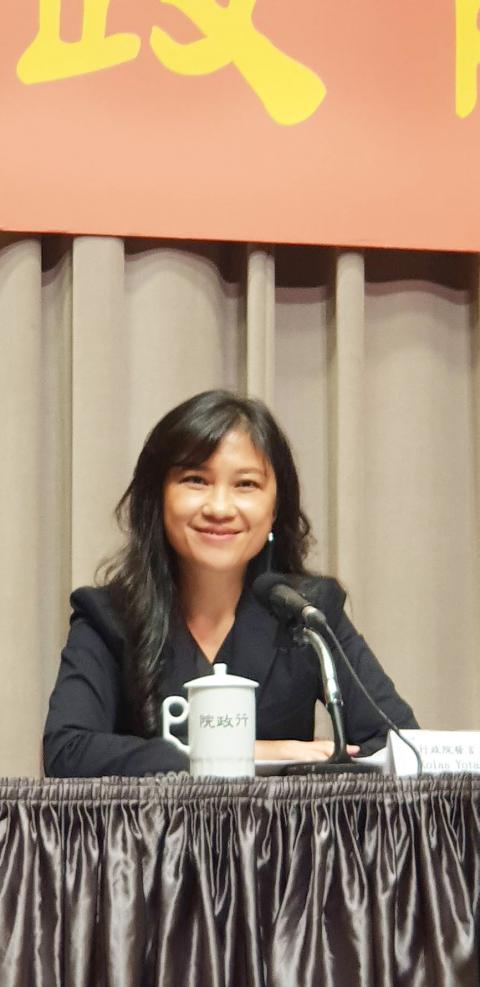Premier William Lai (賴清德) will next year present clear-cut goals for the government’s plan to make English a second official language, Executive Yuan spokeswoman Kolas Yotaka said yesterday.
The Ministry of Education will present an official report to Lai in the next few weeks on its recommendations for adopting English as an official language alongside Mandarin, Kolas said, after Lai discussed the issue in an interview with the Chinese-language Economic Daily News published yesterday.
“I will set a policy goal next year to make Taiwan a bilingual country, with English and Chinese being its official languages,” Lai said in the interview.

Photo: Lee Hsin-fang, Taipei Times
Lai late last year directed the ministry to form a “Committee to Promote English as an Official Language,” which was tasked with studying the issue, carrying out public surveys and drafting a plan on how to achieve the goal.
The ministry submitted the committee’s first report to Lai in June and is expected to present the second and final one by the end of this week or early next month, Kolas said.
The second report is to focus on ways and means of improving English teaching in schools, including establishing bilingual schools or classes and emphasizing spoken English, she said.
It will also deal with legislative issues such as the feasibility of deregulation to help promote a broad bilingual environment, Kolas said.
Earlier this year, then-minister of education Pan Wen-chung (潘文忠) told the Central News Agency in an interview that English competence did not equate to competitiveness, but it lays a foundation on which people can collect accurate information in a timely way, showcase professional expertise or express ideas without language barriers in the international arena, giving them a competitive edge.
“English proficiency opens up opportunities for young people,” Pan said. “We must do this for the next generation.”
Lai, who initiated a similar program in Tainan when he was mayor, has spearheaded the push to make English an official national language.

Tropical Storm Gaemi strengthened into a typhoon at 2pm yesterday, and could make landfall in Yilan County tomorrow, the Central Weather Administration (CWA) said yesterday. The agency was scheduled to issue a sea warning at 11:30pm yesterday, and could issue a land warning later today. Gaemi was moving north-northwest at 4kph, carrying maximum sustained winds near its center of up to 118.8kph and gusts of 154.8kph. The circumference is forecast to reach eastern Taiwan tomorrow morning, with the center making landfall in Yilan County later that night before departing from the north coast, CWA weather forecaster Kuan Shin-ping (官欣平) said yesterday. Uncertainty remains and

SEA WARNING LIKELY: The storm, named Gaemi, could become a moderate typhoon on Wednesday or Thursday, with the Taipei City Government preparing for flooding A tropical depression east of the Philippines developed into a tropical storm named Gaemi at 2pm yesterday, and was moving toward eastern Taiwan, the Central Weather Administration (CWA) said. Gaemi could begin to affect Taiwan proper on Tuesday, lasting until Friday, and could develop into a moderate typhoon on Wednesday or Thursday, it said. A sea warning for Gaemi could be issued as early as Tuesday morning, it added. Gaemi, the third tropical storm in the Pacific Ocean this typhoon season, is projected to begin moving northwest today, and be closest to Taiwan on Wednesday or Thursday, the agency said. Today, there would likely

DISRUPTIONS: The high-speed rail is to operate as normal, while several airlines either canceled flights or announced early departures or late arrivals Schools and offices in 15 cities and counties are to be closed today due to Typhoon Gaemi, local governments announced last night. The 15 are: Taipei, New Taipei City, Taoyuan, Tainan, Keelung, Hsinchu and Kaohsiung, as well as Yilan, Hualien, Hsinchu, Miaoli, Chiayi, Pingtung, Penghu and Lienchiang counties. People should brace for torrential rainfall brought by the storm, with its center forecast to make landfall on the east coast between tonight and tomorrow morning, the Central Weather Administration (CWA) said. The agency issued a sea warning for the typhoon at 11:30pm on Monday, followed by a land warning at 11:30am yesterday. As of

CASUALTY: A 70-year-old woman was killed by a falling tree in Kaohsiung as the premier warned all government agencies to remain on high alert for the next 24 hours Schools and offices nationwide are to be closed for a second day today as Typhoon Gaemi crosses over the nation, bringing torrential rain and whipping winds. Gaemi was forecast to make landfall late last night. From Tuesday night, its outer band brought substantial rainfall and strong winds to the nation. As of 6:15pm last night, the typhoon’s center was 20km southeast of Hualien County, Central Weather Administration (CWA) data showed. It was moving at 19kph and had a radius of 250km. As of 3pm yesterday, one woman had died, while 58 people were injured, the Central Emergency Operation Center said. The 70-year-old